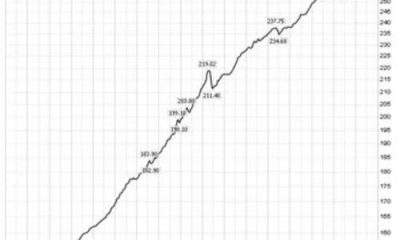Economics
Oil Jumps After China Scraps Inbound Quarantine, Will Reopen Borders Effectively Ending Zero-Covid Regime
Oil Jumps After China Scraps Inbound Quarantine, Will Reopen Borders Effectively Ending Zero-Covid Regime
And just like that China’s zero-Covid…

Oil Jumps After China Scraps Inbound Quarantine, Will Reopen Borders Effectively Ending Zero-Covid Regime
And just like that China’s zero-Covid policy is over.
On Monday, Beijing announced that it will remove the country’s quarantine requirements for inbound travelers from January 8, dismantling the final remnants of a zero-Covid regime that closed it off from the rest of the world for almost three years, sent its economy in an on again/off again tailspin, and which not only sparked a record surge of new covid infections which have failed to translate into a zombie apocalypse (confirming that covid was never much stronger than the flu) but also has forced China to halt all official covid data reporting after being caught lying one too many times, an unheard of event for China where every “data point” is fake.
Starting Jan. 8, people arriving in China will no longer be quarantined, though they will be required to obtain negative Covid test results within 48 hours of departure. That compares with the current requirement of eight days isolation — five days at a designated quarantine hotel, or central facility, followed by three days at home. At one point this year the quarantine arrival rule required travelers to spend three weeks in a hotel room.
The country also downgraded the management of Covid from the highest level to the second highest, effectively removing the legal justification for aggressive Covid Zero restrictions. Still, the National Health Commission said it will continue to monitor the virus’s spread and vowed to take appropriate measures to suppress the peak of Covid outbreaks.
China’s National Health Commission unveiled the move as part of a wider announcement that downgraded the country’s management of Covid-19, a virus which is currently sweeping the nation, and definitively abandoned a host of other preventive measures. The NHC also said that more than 90% of cases of the omicron variant were “mild or asymptomatic”, part of a shift in tone towards coronavirus as it rages across a country where until recently very few of the 1.4bn population had contracted it, at least according to the government’s fabricated numbers.
In its long overdue scramble for natural immunity, the government, which this month also scrapped the requirement for positive cases to quarantine at central facilities, is now battling a severe winter outbreak with estimated cases spiraling into the hundreds of millions and health services under pressure. While models have estimated the virus could lead to close to 1 million deaths – probably the same models that predicted the end of western civilization as we know it some time in late 2020 – China’s public data has ceased to reflect the situation on the ground and other zero-Covid rules such as mass-testing have largely ended.
China pursued a strict zero-Covid policy – the pet project of dictator Xi Jinping – shortly after the pandemic first emerged, locking down many of its largest cities over multiple years of the policy and imposing quarantine requirements on foreign arrivals as part of an attempt to eliminate the virus within its borders. But late this year, the policy finally began to unravel as authorities struggled to contain outbreaks across multiple cities, including the capital Beijing, while violent protesters took to the streets in November in a rare display of defiance against the central government’s approach, which was the tipping point that led Beijing to dramatically relax the policy shortly afterwards.
As the FT puts it, “Monday’s announcement signals the end of the zero-Covid system that transformed China’s relationship with the outside world, and which for long periods successfully limited the transmission of a virus that had swept through every other advanced economy”, which prevented the country from developing a natural immunity to the made in Wuhan virus, and ensured that covid-zero would keep the country locked down for decades to come.
The sudden removal of restrictions has already put immense pressure on China’s healthcare system, especially in Beijing, which was one of the centers of the outbreak prior to the policy’s abandonment and was thought to be one of the best prepared cities. The result has been another hoarding panic, with local reports indicating there has been a run on the pharmacy in the past few days resulting in “absolutely nothing” left.
China covid: A medicine shortage: elderly said ‘no ibuprofen, no aspirin, no vitamin C, absolutely nothing’#chinacovid pic.twitter.com/fTbIiKyMdX
— Spotlight on China (@spotlightoncn) December 26, 2022
Analysts have also warned over the economic and corporate costs – at least in the short term until natural immunity is built up – of the virus itself as it sweeps the country, with Apple among those vulnerable to further supply chain issues.
Under zero-Covid, citizens in China were required to test every few days at booths across major cities and then scan a code on their phones to enter buildings. Such practices have largely disappeared as cases multiplied rapidly, though as recently as late November individuals in Shanghai were still being taken to central quarantine because they were close contacts of positive cases at bars.
While the market had been pricing in the end of covid zero at some time in late Q1 or early Q2, the accelerated end of China’s most defining policy of the post-Covid era has sent oil higher as traders start pricing in the massive commodity demand that will follow a full reopening of China in the days following China’s new year.
And indeed, early on Tuesday, China’s Securities Times reported that according to Liu Yuanchun, president of the Shanghai University of Finance and Economic, China will take “extrordinary” measures to stimulate growth, including selling special sovereign bonds next year as part of efforts to boost economic growth,
The economy “faces extraordinary pressure in 2023 and we need to take some extraordinary policies,” the newspaper quoted Liu as saying. He also said the government may raise its budget deficit to more than 3% of gross domestic product. Liu expects M2 growth to come in at around 11.5% next year, providing rather sufficient liquidity support for the economy, according to the report
The government may also “moderately” reduce new tax breaks next year to ensure fiscal sustainability as it continues to increase spending, said Shi Zhengwen, director of the Center for Research in Fiscal and Tax Law at China University of Political Science and Law.
In other words, after a brief derailing, the stimmy train is back on the tracks and making its first stop in China, and soon everywhere else.
Tyler Durden
Mon, 12/26/2022 – 19:32
commodity
policy
commodity demand

Argentina Is One of the Most Regulated Countries in the World
In the coming days and weeks, we can expect further, far‐reaching reform proposals that will go through the Argentine congress.
Crypto, Crude, & Crap Stocks Rally As Yield Curve Steepens, Rate-Cut Hopes Soar
Crypto, Crude, & Crap Stocks Rally As Yield Curve Steepens, Rate-Cut Hopes Soar
A weird week of macro data – strong jobless claims but…
Fed Pivot: A Blend of Confidence and Folly
Fed Pivot: Charting a New Course in Economic Strategy Dec 22, 2023 Introduction In the dynamic world of economics, the Federal Reserve, the central bank…




















